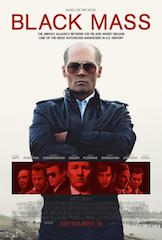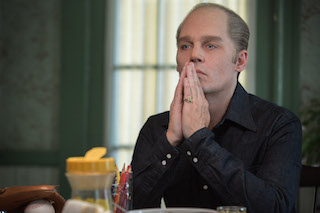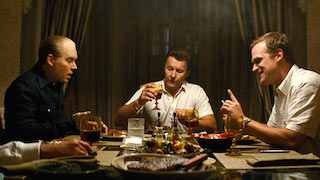 James “Whitey” Bulger, for much of his sixteen years on the run, was the FBI’s 2nd most wanted man behind Osama Bin Laden, you know, the terrorist. His infamous company at the top of the FBI’s rogue’s gallery is a testament to the severity of Whitey’s criminal history. He has been connected to, and subsequently charged with, nearly 20 murders, as well as a slew of other gangster related charges. Black Mass, adapted from the book of the same name, holds nothing back in it’s portrayal of Bulger’s real-life and savage criminal past.
James “Whitey” Bulger, for much of his sixteen years on the run, was the FBI’s 2nd most wanted man behind Osama Bin Laden, you know, the terrorist. His infamous company at the top of the FBI’s rogue’s gallery is a testament to the severity of Whitey’s criminal history. He has been connected to, and subsequently charged with, nearly 20 murders, as well as a slew of other gangster related charges. Black Mass, adapted from the book of the same name, holds nothing back in it’s portrayal of Bulger’s real-life and savage criminal past.
Director Scott Cooper holds up his end of the bargain in his first foray into directing a movie he did not write. Previous entries Crazy Heart, winner of two Oscars, and Out of the Furnace showed Cooper has a natural air of comfort with seasoned actors to draw out deep, powerful performances. In Johnny Depp, Cooper is reaching deeper into dark, depravity than he ever has, and Depp attempts to reach back to all the way to 1997 and channel his role in Donnie Brasco as a Mafia-sympathizing FBI agent.
When we meet Depp’s Jimmy Bulger for the first time he looks on with menacing quiet as his fellow members of Winter Hill, a notorious South Boston gang, talk shop about petty crime. When Martorano (W. Earl Brown) “double dips” his licked fingers into the bowl of nuts, Jimmy spits a flash of venom to cease his disgusting habit. Bulger is tightly packed and like Joe Pesci in his countless gangster roles, an offhand comment or brazen affront could set him off like a powder keg.
 His rise to power comes when an old “Southie” friend and now FBI agent, John Connolly (Joel Edgerton), meets with Jimmy’s younger brother, state senator Billy Connolly (Benedict Cumberbatch). John and Jimmy cut a deal where Jimmy will ally himself with the FBI, not be there informant, in order to bring down the powerful North Boston Italian mob under the Angiulo family. There rise to success and power are simultaneous as Jimmy gives the FBI the Angiulo family and John consistently diverts attention from Jimmy’s crimes and his influence and power grow. There fates become tied together and the story follows their rise and subsequent fall.
His rise to power comes when an old “Southie” friend and now FBI agent, John Connolly (Joel Edgerton), meets with Jimmy’s younger brother, state senator Billy Connolly (Benedict Cumberbatch). John and Jimmy cut a deal where Jimmy will ally himself with the FBI, not be there informant, in order to bring down the powerful North Boston Italian mob under the Angiulo family. There rise to success and power are simultaneous as Jimmy gives the FBI the Angiulo family and John consistently diverts attention from Jimmy’s crimes and his influence and power grow. There fates become tied together and the story follows their rise and subsequent fall.
While the facts of Bulger’s criminal past and ties to the FBI are fascinating, the problem with Black Mass is that it lacks any real stakes. Depp’s Bulger changes little, even after his son, Douglas, gets sick and dies of the rare Reye’s syndrome and his mother passes away. The scenes hope to convey humanity but do nothing to break the icy, collected exterior Depp has created for his character. At no point are we allowed under the hood of Bulger’s inner workings; suffering through long stretches of Edgerton’s Connolly hemming and hawing with his FBI bosses and sporting an uneven South Boston accent. At its worst, Black Mass is a derivative crime drama that struggles to be interesting. At its best, it is a morose gangster movie with some intense performances but with little in peril.
In fact, the only stakes the movie delivers is a sequence with literal steaks. When Bulger and Steve Flemmi (Rory Cochrane), his close associate in the Winter Hill Gang, go to Connolly’s house for a steak dinner with John’s fellow corrupt FBI agent John Morris (David Harbour), Cooper and Depp work a spectacular dinner table scene to heighten suspense and ratchet up tension. Immediately after that scene at the dinner table, Depp takes it from suspenseful to terrifying in a sickening encounter with Connolly’s wife, played well by Julianne Nicholson. In fact, the two sequences where Bulger’s horrifying brutality is most evident are with Nicholson and a scene a little bit later with young actress Juno Temple as a young prostitute and Cochrane’s Flemmi. Both sequences pulsate with calculated barbarism and a ferocious madness that do full justice to chronicling a man charged with killing nineteen people.
Kevin Weeks, another fellow Winter Hill Gang member portrayed with surprising nuance by Jesse Plemons, said in a real-life interview of Bulger that he had a “Machiavellian” quality that made his criminal rise possible. Another “dinner table” scene, proving every great gangster portrayal needs a good table, has Jimmy waxing with Machiavellian eloquence about little Douglas’ encounter with a schoolyard bully. Jimmy asks him if he got in trouble because he punched the bully in the face. When Douglas doesn’t know how to respond, Jimmy, against the admonitions of his wife (Dakota Johnson), tells him he got in trouble because he punched him in front of other people. Bulger philosophizes, “It’s not what you do, it’s when and where you do it, and who you do it to or with. If nobody sees it, it didn’t happen.” Connolly likewise espouses the same ideology when confronted with his “deal with the devil” at the FBI and he justifies going against protocol to get at “the bigger truth”.
Few can understand the sort of soul-sucking rationalizing a killer must make with himself, but Bulger’s quote and Connolly’s whitewashing of the law is a grim reminder of the ease humans take to justify the worst of crimes and the most petty of sins. What seems like an obviously self-centered apology to commit murder, theft, and trafficking is also a common excuse adopted for secret vices, hidden lusts, and private wrongdoings.
Not only does that kind of philosophy deny the humanity of those wronged, but it also denies the very nature of Christ. If God can see us practice our righteousness in private, as Jesus says in the Sermon on the Mount, then surely he likewise sees us if we practice unrighteousness in private, just as much as before men. Hebrews says, “nothing in all creation is hidden from God’s sight,” and only the wicked deny God’s ability to mete out justice, even in private. Black Mass is a cinematic gathering of shadows around the common table of unjust murder, extortion, and lies.

1 comment